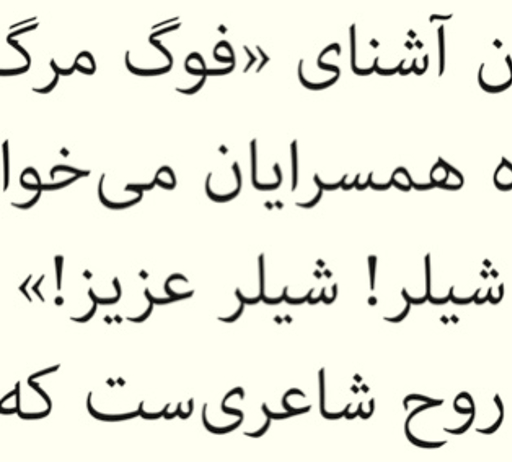
نام آن پرندهی غمگین
بانوی پارسی، از غسل کودکش در آفتاب سحرگاھی بر میگردد
.و از کنار خاکستر کلبهی بوسیس و فیلمون، تلخ میگذرد
(.از استخوانھای سوختهی آن دو و میھمانشان ھنوز دود برمی خیزد)
،آقای فاوست با چشمھای خیس و دلی لرزان
.از اوج برج، بر قلمرو بیانتھای خویش، فاتحانه مینگرد
.سرود شادی» با روشنترین واژهھا، در آسمان اروپا طنین میاندازد»
گوته، خیره در چشمھای دخترک شعر آسمانی ھاینه
:آخرین جملهاش را مینویسد و قلم را بر زمین میگذارد
«.زنانگی جاودانه، به فراز بر میکشاندمان. درستش این است»
.آنک «سرود شادی» در افق دوردست رو به خاموشیست
بانوی سالخورده، در جامهای سیاه به صحنه میآید
.و ارواح مردگان را به صحنه فرا می خواند
.تالار، زیر بارش نتھای خاکستری، تاریک میشود
.طنین آشنای «فوگ مرگ» شانهی ارواح را به لرزه میاندازد
:گروه ھمسرایان میخوانند
«!آه شیلر! شیلر عزیز»
.این روح شاعریست که موھای مادرش ھرگز به سپیدی نرسید
(.و او ھمان کسیست که شیر سیاه سپیدهدمان را نوشید و در تابوت آب سفر کرد)
.این روح مردگانیست که مرگ از استخوانھای پوکشان نیلبک میساخت
.آن دیگری زنیست، فاحشهای که زیر رگباری از تگرگ، کودکی مرده میزاید
.اینان «بافندگان شلزی»اند که برای تمدن ما کفن میبافن
آن دیگران، دیوانگانیاند بر کرانهی دریای دور شبزده
.چشم انتظار پاسخی که نیست؛ ھرگز نبوده است
و این یکان، پلنگاناند، ھمان پلنگان در قفس ریلکه
و گاه، فیلی سفید، یکی فیل، چرخان، چرخان، چرخان
و آنان، دوشیزگانی که بر کرانهی دریا به تماشای شفق ایستادهاند
و «آه کشیدن» را از یاد بردهاند
و ھیچ یک نمیدانند، که نام آن پرندهی غمگین
.کز قلبھا گریخته، «ایمان» است
Translation by Daisy Fried
English version by Daisy Fried,
based on a literal translation from the Persian by Alireza Abiz
The Parsi couple returning from bathing their baby under the
morning sun
sadly passes the ashes of Baucis’ and Philemon’s hut,
smoke still rising from their burnt bones, and from their guest’s bones.
Weepy, heavy in his heart, Herr Faust surveys
his endless dominion from the top of his tower
as Ode to Joy rings out in European skies. God sparks!
Heine’s muse had the most heavenly eyes – Goethe gazes there,
writes his last sentence, puts his pencil down:
Eternal Womanhood leads us higher.
Ode to Joy fades in the distance.
An old lady takes the stage dressed in black
and summons ghosts of the dead.
The hall darkens, the music becomes grey rain.
Todesfuge shakes the ghosts.
Oh Schiller! Dear Schiller! the chorus sings.
This is the ghost of Antschel-Celan whose mother’s hair never
turned white
she’s the one who drank the black milk of morning and travelled to a
grave in the clouds.
These are the ghosts of those from whose hollow bones death began to
whittle his flutes.
This other is the one they call whore, whose child is born dead in icy
convulsions.
These are the Silesian Weavers, weaving civilisation our funeral
shrouds.
Those other fools wait by the sea, by the dumb dead night-coloured sea,
for an answer that never has, will never, come.
And this is the panther, Rilke’s caged panther.
And now and then, a white elephant moves, turns, circles.
And at the seaside, the young people are watching the sunset
who have forgotten how to sigh,
and no one knows
the name of the sad dove that’s flown their hearts is faith.
Additional Texts
Click here to read the literal translation by Alireza Abiz.
